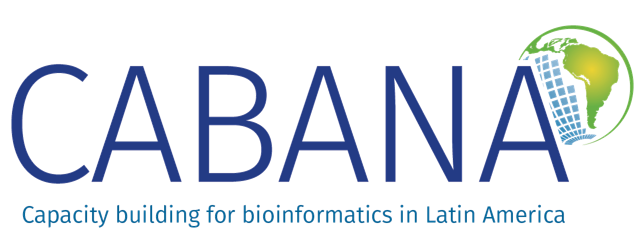News
Interview: From Secondee to Scientific Training Officer
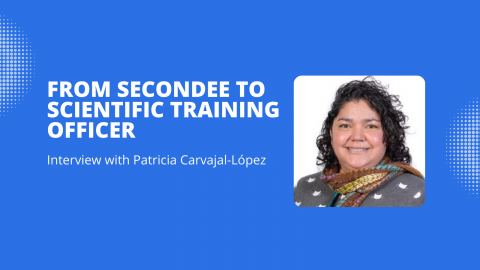
Patricia Carvajal-López joined EMBL's European Bioinformatics Institute (EMBL-EBI) in 2019 for her CABANA secondment where she worked on analysing the status of bioinformatics training in Latin America. She has now progressed to working as a Scientific Training Officer where she focuses on the delivery of training courses in life sciences. We sat down with Patricia to talk about CABANA and its impact on her journey so far.
What is your current role and how did you get here?
Currently, I am a Scientific Training Officer at EMBL's European Bioinformatics Institute (EMBL-EBI). This mainly involves the development and delivery of training courses focused on different areas within the life sciences. I began working with the EMBL-EBI training team in 2019 when I joined as a secondee for the CABANA project. Eventually, I joined this team as a Scientific Training Officer in 2021. Most of my work after graduate school had been related to scientific training, promotion of science and strengthening of communities of practice, which I greatly enjoy. These tasks are vital to my role, so I continued this same path.
What does your typical day look like?
Coffee, deskwork, lots of reading, meeting different groups/people, and when it’s time to run courses, deliver these events in coordination with our Events Organisers and System Administrators. Did I mention coffee? No seriously, strengthening scientific capacities is essential for research and academia, so my day implicates working with researchers, principal investigators and different parties committed to scientific training.
You were a secondee at CABANA. Can you take us through what you worked on during that period?
I compare my secondment to a snowball going downhill. It started as a project to analyse the status of bioinformatics training in Latin America and create a deliverable training programme in basic bioinformatics and scientific computing to life sciences at undergraduate levels. This grew to cover these two objectives plus, associating with other secondees and Latin-American researchers committed to training lecturers, delivering the Train the Trainer workshops in Spanish and Portuguese, participating in international events to promote scientific training and representation of Latin America in such forums, science advocacy for my country, getting involved in evaluating bioinformatic competency frameworks, joining the team that delivers the yearly bioinformatics education summit, and other tasks relevant to training and communities of practice in this region.
What was the impact of the secondment on your professional and personal journey?
Being an electrical engineer who eventually went into the life sciences through bioinformatics made me visualise how engineering methodologies complement biological research and how technical skills such as programming benefit analysis within these areas. This is where the CABANA secondment helped me the most. I’ve been reaching an international community to promote technical training and increase Latin-American representation in world-renowned training forums. I became part of teams that are highly enthusiastic about strengthening bioinformatics capacities, promoting networking within Latin American communities and taking actions to address problems such as language barriers in education, centralization of scientific training, among others. Without even realizing when exactly, I’ve also become an academic promoter through social networks such as Twitter and an advocate for Latin-American representation in life sciences. I believe that everyone is committed to making a good impact on their communities, and this secondment has been crucial for me to take that route.
CABANA e-Learning: Four new courses and more to come
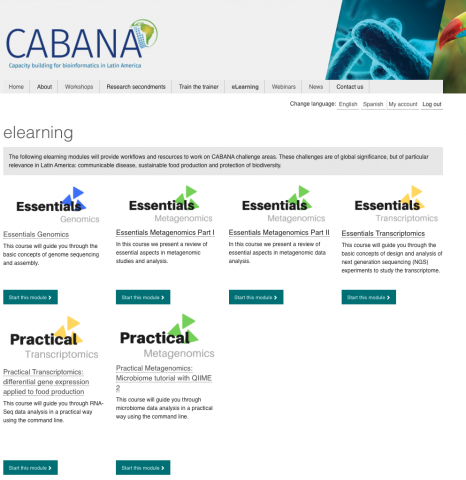
We announce the publication of four courses for the bioinformatics community:
-
Essentials Genomics
-
Essentials Metagenomics part II
-
Practical Transcriptomics Differential Expression applied to Food production
-
Practical Metagenomics Microbiome tutorial with QIIME2
The authors are collaborators of the CABANA project including Ángela Peña, Alejandro Sánchez, Randall Jiménez, Alejandro Reyes and Rebeca Campos.
All tutorials are published in Spanish and English to be used in the CABANA platform (https://www.cabana.online/
Go to this webpage to get started and register: https://www.cabana.online/
A quick tour of the platform could also be useful:
English video https://youtu.be/
Spanish video https://youtu.be/mDHh5bhGihE
Bioinformatics in Latin America: ISCB-LA SOIBIO RMB Symposium 2020
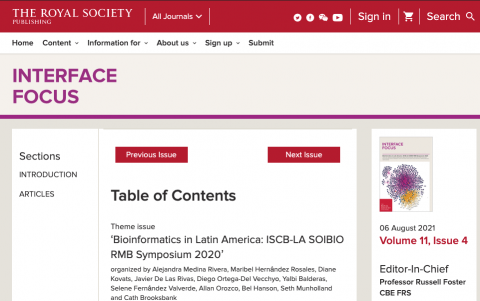
Royal Society Publishing has recently published a special issue of Interface Focus entitled Bioinformatics in Latin America: ISCB-LA SOIBIO RMB Symposium 2020 organized by Alejandra Medina Rivera, Maribel Hernández Rosales, Diane Kovats, Javier De Las Rivas, Diego Ortega-Del Vecchyo, Yalbi Balderas, Selene Fernández Valverde, Allan Orozco, Bel Hanson, Seth Munholland and Cath Brooksbank.
Read the articles from here https://royalsocietypublishing.org/toc/rsfs/2021/11/4
There is also a blog post at https://royalsociety.org/blog/2021/06/advancing-bioinformatics-research-in-latin-america/
A print version is also available at the special price of £35.00 from debbie.vaughan@royalsociety.org
The third Call for CABANA secondments is now open
CABANA’s research secondments are aimed at catalysing lasting collaborations between researchers in Latin America and bioinformatics groups in the UK.
Scientists from Latin America can apply for a secondment of 6 months to pursue a bioinformatics research project in the challenge areas of the CABANA project. However, this call is focused on topics of interest to Latin American institutions such as:
- The SARS-CoV-2 genome, its evolution and epidemiology in Latin America.
- Whole Genome Sequencing of Race II and Low-Coverage Sequencing of Twelve Additional Isolates of the Coffee Rust, Hemileia vastatrix.
- Analysis of natural and induced genetic diversity of populations of coffee in Costa Rica and Mexico using GBS.
- Paleometagenomics of Microbialites in the Puna.
- The Genome of Yerba Mate (Ilex Paraguariensis).
- Exploring the microbiomes of soils associated with contrasting agricultural systems across Latin America. Genomic Diversity of Yeasts Associated to Natural Agave Fermentation.
Particularly interesting this time, is that most (if not all) secondments will be virtual allowing easier interaction with multiple researchers in the region and at EMBL-EBI. Look for more details here and apply soon, the deadline is February 12, 2021.
ISCB-Latin America 2020’s Virtual Train the Trainer workshops
After two successful online Train the Trainer workshops, the organizing team will deliver the next training events in Spanish, and for the first time, in Portuguese!
CABANA secondees Maria Bernardi, Patricia Carvajal, Mindy Muñoz, and scientific training officer Piv Gopalasingam from EMBL-EBI will co-deliver the Train the Trainer / Entrenamiento de Instructores / Treine o Treinador workshops. They will take place within the ISCL-LA/SoIBio/BioNetMX 2020 conference virtual workshop series this October 22nd and 23rd (9:00 to 13 hrs Mexican Central Time).
Over the course of two half day sessions participants will work in groups to share thoughts and ideas regarding training and course preparation while visiting different theories related to learning processes. This will also be an excellent opportunity to extend their training and research network.
These Spanish and first fully Portuguese Train the Trainer events are a big step towards sustainability for Latin America, facilitating capacity building of trainers across the region.
#TrainTheTrainer, @CabanaGcrf, #ISCB-LA_SoIBio_BioNetMX2020, register: https://www.iscb.org/iscb-latinamerica2020-p-s/iscb-latinamerica2020-worktut .
October 22nd and 23rd (9 to 13 hrs Mexican Central Time)
For further information on the workshop, please visit the event page.
---Español---
Taller Virtual Entrenamiento de Instructores del ISCB-Latin America 2020
Después de dos talleres en línea de Entrenamiento de Instructores (Train the Trainer), el equipo no ha detenido sus esfuerzos y realizará el siguiente taller en español, y por primera vez, ¡El TtT en portugués!
Las integrantes de CABANA, Maria Bernardi, Patricia Carvajal, Mindy Muñoz y el oficial de capacitación científica Piv Gopalasingam (EMBL-EBI) ofrecieran los talleres Train the Trainer/Entrenamiento de Instructores/Treine o Treinador. Estos eventos virtuales serán llevados a cabo los días 22 y 23 de octubre de 9 a 13 horas (horario del centro de México) en el marco de la conferencia ISCL-LA/SoIBio/BioNetMX 2020.
En el transcurso de dos sesiones de medio día, los participantes trabajarán en grupos para compartir opiniones e ideas sobre la capacitación y la preparación de cursos mientras que abordan diferentes teorías relacionadas con los procesos de aprendizaje. También será una excelente oportunidad para ampliar su red de capacitación e investigación.
Estos Train the Trainer, uno en español y el primero totalmente portugués, significan un gran paso hacia la sostenibilidad de América Latina en términos de desarrollo de capacidades de formadores en los países de esta región.
#EntrenamientoDeInstructores, @CabanaGcrf, #ISCB-LA_SoIBio_BioNetMX2020, registro: https://www.iscb.org/iscb-latinamerica2020-p-s/iscb-latinamerica2020-worktut .
October 22nd and 23rd (9:00 to 13 hrs Mexican Central Time)
---Portugues---
Oficina Virtual Treine o treinador do ISCB-Latin America 2020
Depois de duas oficinas virtuais de “Entrenamiento de Instructores” (Train the Trainer) em espanhol, o team não para com os esforços e irá realizar a seguinte oficina em português pela primeira vez, ¡O TtT em português!
As bolsistas do CABANA, Maria Bernardi, Patricia Carvajal, Mindy Muñoz e o treinador científico oficial Piv Gopalasingam (EMBL-EBI) vão oferecer as oficinas virtuais Train the Trainer/Entrenamiento de Instructores/Treine o Treinador que acontecerão os dias 22 e 23 de outubro de 9 às 13 horas (horário do centro México) ISCL-LA/SoIBio/BioNetMX 2020.
Ao longo das duas sessões de meio dia, os participantes trabalharão em grupos para compartilhar opiniões e ideias sobre o treinamento e a preparação de cursos, enquanto abordam diferentes teorias relacionadas aos processos de aprendizagem. Será uma excelente oportunidade para expandir as redes sociais em termos de capacitação e pesquisa.
O “Train the Trainer” em espanhol e agora a primeira versão em português, significam um grande passo em direção à capacitação de formadores no Brasil em termos de sustentabilidade para América Latina.
#TraineOTreinador, @CabanaGcrf, #ISCB-LA_SoIBio_BioNetMX2020, registro: https://www.iscb.org/iscb-latinamerica2020-p-s/iscb-latinamerica2020-worktut 22 e 23 de outubro de 9 às 13 horas (horário do centro México).
CABANA e-Learning is LIVE in Spanish and English
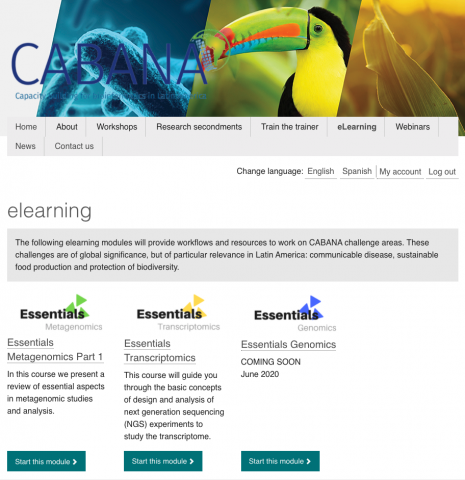
The CABANA community can now access the first two courses in bioinformatics called Essential Transcriptomics and Essential Metagenomics (part I). The vision of these resources is that people can learn basic and high level bioinformatics in any of these languages, Spanish or English, because language can sometimes be a barrier to learn at the beginning. The current courses cover the theory of these two methods, including experimental design, sequencing technologies, and basic bioinformatics pipelines.
These courses were developed by experienced scientists and professors, and have gone through a reviewing process to guarantee good and updated science.
We plan to publish over the next months the Essentials Genomics course, and multiple Practical courses with real data examples relevant to the three challenge areas of CABANA. It's time to get your hands dirty with some data analysis!
Go to this webpage to get started and register: https://www.cabana.online/
A quick tour of the platform could also be useful:
English video https://youtu.be/A6VJ3a5C7m0https://youtu.be/A6VJ3a5C7m0
Spanish video https://youtu.be/mDHh5bhGihE
Sequencing viral genomes: hands-on in Costa Rica
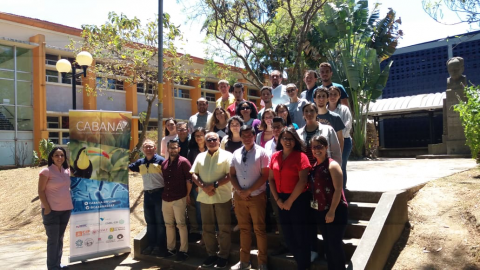
Between February 24th - March 4th 2020 the University of Costa Rica hosted the CABANA workshop, “NGS analysis applied to virome sequencing in agricultural systems”.
This workshop was unique in that the first week was focused on nucleic acids extraction (small and large RNAs) and library preparation to sequence on the NextSeq Illumina instrument. For this we had a great team of trainers, Segundo Fuentes and Ana Pérez from CIP; Ivannia Atmetlla, Ricardo Chinchilla and Rebeca Campos from UCR. We wanted a small group (10) of trainees to use the protocols and evaluate whether this wet-lab training could improve their experimental design and understanding of data analysis later on. Though we had some drawbacks, as is natural from wet-lab trainings, some comments from the trainees show the importance of complementing, when possible, bioinformatics training and wet-lab experience:
“The trainers have a lot of experience in the topics covered during the course and they were able to clear all the doubts that emerged during the course of the workshop. It was very useful that one can participate in each step of the library preparation, because I consider that is the only way to really learn the protocol.”
“Everything was good. I learned new techniques, also some procedures I did before but not for NGS so I learned how to adapt it for NGS.”
“The hands-on part. I have the feeling that everyone learns better from doing experiments.
“After the workshop I have been thinking about some ideas for future projects using the knowledge aquired from the course”
“Great experience with well-known trainers and collaborators. I would definitely love to repeat this experience. Thanks CABANA and UCR”
The following week we had a full room (21) of participants from Argentina, Brasil, Colombia, Ecuador, Mexico, Peru, and Costa Rica, to learn the basic analysis to identify and reconstruct viral genomes from small RNAs using the software VirusDetectW, Geneious, RDP and R libraries for network analysis. The trainers Jan Kreuze, Ricardo Alcala and Segundo Fuentes did a great job.
Thank you to all the organizers, trainers and trainees for making this another successful CABANA workshop!
Discovering Mexico's heart alongside a master class in “Chemoinformatics in Drug Discovery”
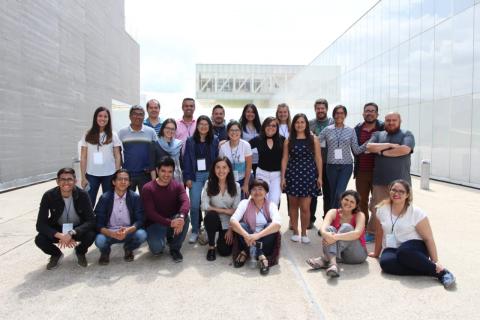
“Chemoinformatics in Drug Discovery” hosted at the National Laboratory in Genomics for Biodiversity (CINVESTAV UGA LANGEBIO) between October 15th and 18th, 2019 was a successful CABANA workshop. Twenty-four delegates from different regions of Latin America - Mexico, Colombia, Peru, Argentina and Cuba – attended the workshop and discovered Mexico’s heart. Our 5 speakers Dr. Jose Luis Medina Franco (from UNAM Mexico City), Dr. Fabien Plisson (from CINVESTAV UGA LANGEBIO, Irapuato), MSc. Rodrigo Ochoa (University of Antioquia, Colombia) as well as UNAM students MSc. Barbara Diaz and Edgar Lopez introduced the participants to theories and practices in computer-aided drug discovery – structure-based and ligand-based drug discovery. All classes were well received. The workshop opened new collaborations and possible projects between the represented institutions.
How can DNA Barcodes help protect against smuggling and extinction of endangered species?
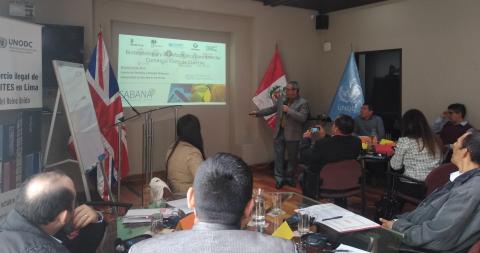
CABANA partner, Ricardo Fujita from Universidad de San Martín de Porres, Peru, gave a presentation to the Latin America Regional Conference to fight Illegal Wildlife Trade in Lima on 1st October.
Ricardo discussed how the identification of specimens, part of them or processed products, by a system using DNA Barcodes or DNA metabarcodes is a must to help the protection against smuggling and extinction of endangered species.
It raised interest and willingness to collaborate from Peru National Prosecutor for the Environment, the Prosecutor of Environment at the National Customs, UNODC Environment Crime Project Specialist, Wood Productive Innovation and Technology Transfer Center of Peru and some NGOs involved in Wildlife Diversity Protection.
Travel fellowship for SoiBio 2019
Applications are now open for CABANA Travel Fellowships to participate in the X International Conference on Bioinformatics - SoIBio+10 that will take place in Montevideo (Uruguay) from the 28th October to the 1st November this year 2019 (https://sites.google.com/view/soibio19/home)
Conditions:
- CABANA Travel Fellowships will be awarded to scientists (mainly PhD students or young postdoctorals) from Latin-America eligible countries (i.e. countries indicated in the Application Form), that send a communication to the X International Conference on Bioinformatics - SoIBio+10.
- CABANA Travel Fellowships will offer to the selected fellows a grant to cover the Registration fees, the Hotel accommodation and the Return Flights to the X International Conference on Bioinformatics - SoIBio+10. The grant has a maximum limit of £1125 per fellow. The registration and the accommodation will be directly paid to the Conference once the applicant is selected. The flight will be reimbursed to each travel fellow upon submission of a travel claim form (that will be provided by CABANA) which should include copy of the air ticket and boarding passes.
- CABANA Travel Fellowships will be awarded according to the quality of the scientific communication sent to the X International Conference on Bioinformatics - SoIBio+10, but also considering the CV and the needs of the applicant. Early-stage researchers, women and underrepresented groups are especially encouraged to apply.
- For the application the candidates have to fill this CABANA Application Form (https://forms.gle/DqM5jZ1R6xQzF7Yj6) and at the same time fill the SoIBio+10 Registration Form in the website of the Conference. In the CABANA form the following documents will be asked to you: (i) copy of the title and abstract (500 words) of the communication sent to the Conference; (ii) a brief CV (not more than 2 pages indicating degree, current status and institution); (iii) a brief budget calculating approximately the cost of your flight (i.e. return tickets to Montevideo) .
- The deadline for the application of the CABANA Travel Fellowships is midnight UTC on Saturday, September 15th.
